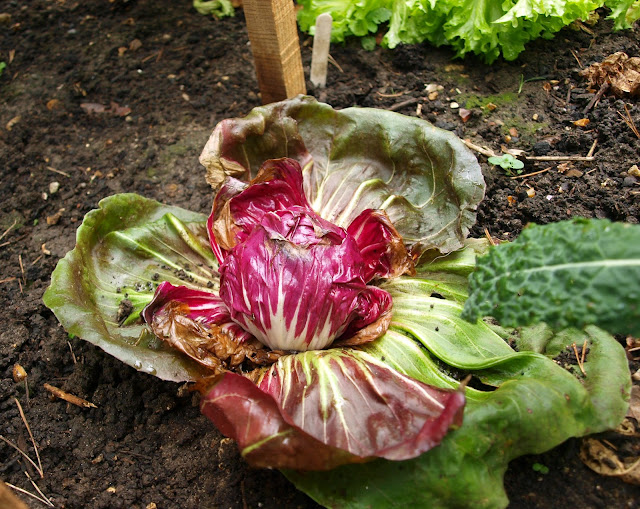This year I sowed my Radicchio in two batches - one on 27 May and another on 24 July. They were seeds of the variety "Firestorm", from Duchy Seeds. I used a recycled plastic mushroom box as a seed-tray. The ones sowed in May are the ones maturing at present, whereas the July ones are still quite small. My first photo was taken at the seedling stage, on 9 July, the day on which I planted them out into one of my raised beds.
I planted them at a spacing of about 25cm, because I knew they would get a lot bigger. Here they are on 17 July, well established and beginning to develop their first red streaks.
Radicchio requires very little attention - just occasional watering, though it is much less demanding than lettuce in this respect. It doesn't seem to suffer from attacks by slugs and snails as much as lettuce does either - perhaps they don't like its slightly bitter taste? This one is still immature, but beginning to "put on weight" and form a heart.
Here is one that is nearing maturity, looking glossy and well-presented.
This one is ready to harvest. The green outer leaves have gone ragged, and have fallen away, exposing the red heart of the vegetable.
You might think this one is "past it" or diseased, but you'd be wrong. I find that it is quite normal for Radicchio plants to go brown and squishy on the outside while remaining crisp and shiny on the inside.
Look at this: you peel back the brown outer leaf, and inside you get this bright red ball of loveliness!
Here it is all cleaned-up and ready to be taken into the kitchen. I should point out that although this one is only about the size of a tennis ball, it is very tightly-packed and will provide lots of edible leaves.
And of course, this is where it all ends up...
One final thought:- when harvesting, cut the plant at ground level, leaving the root in the soil. The root will re-sprout (but probably not until the Spring), and produce another crop of useable leaves, though regrettably not a second heart.










Lovely colour makes a change from the usual green salad.
ReplyDeleteI have GOT to try growing some of these.
ReplyDeleteI just finished reading through you last few posts... all I can say is nice, very nice veggies.
ReplyDeleteThey are very beautiful aren't they. I am having trouble with my lettuce not getting particularly big at the moment - lots of tennis balls (or often smaller). I'm wondering if its a food thing, or perhaps nitrogen. They eat well but I need a lot of them for my salads.
ReplyDeleteDid your ears burn today? Did you have a little shiver? Are we connected via ESP? I thought about you today as I walked among the seedlings at my favourite nursery...and bought some chilli plants. I was looking for some with 'mild' on them, but they only had 'very hot', 'much hotter', and 'blow your brains out'. I bought some anyway. They will look nice in the greenhouse and, eventually, strung up somewhere. I am sure I can give some away.
ReplyDeleteIf I don't plan on using them, why did I buy them....just to give you a chilli fix in your freezing winter and to remind you that, one day, the sun will shine again.
Hi Hazel; Thanks for thinking of me! I look forward to seeing some lovely specimens. I wouldn't believe everything they say about the heat in your chillis. At least two of my types were rated in the catalouge as 4/5 on a heat scale of 1 to 5 (5 being the hottest), but as you know, they have proved to be quite mild.
ReplyDeleteIs this bitter like chicory? We did grow raddichio once and I seem to remember something like that.
ReplyDeleteSue; Radicchio is basically a red type of chicory. I find that it is sweeter than the "Witloof / Belgian Endive" type. Lovely with a honey-and-mustard dressing...
ReplyDeleteNow I regret I did not order radicchio seeds when I just ordered my summer vegetable seeds online just now. But I will be putting it in my wish list for fall planting.
ReplyDeleteThanks to your posts Mark, I am getting an education on the European vegetables that I don't see in my country. Would you believe it, if I told you that I was expecting to see pictures of some kind of radish, when I read the post title.
ReplyDeleteThat's some lovely radicchio. And so nice for salads. It does better for us when grown in fall, but it still usually heads up when planted in spring.
ReplyDeleteI have not grown raddichio in years because I am the only one that does not mind the more bitter flavor of it. I may have to tuck a few in next year though just to add a splash of color and fun.
ReplyDeleteGreat time lapse of radicchio. I have a friend who make a great Caesar salad with it. It's delish!
ReplyDeleteAh, wonderful to find your blog! You may be an ocean away, but very similar growing conditions I would imagine. And perfect timing, I was just thinking to add radicchio to next year's planting list — maybe some Treviso, though the Castelfranco is awfully tempting. Would love to have some to grill, or add to a risotto... Thanks for the tip about getting a second growth!
ReplyDeleteI've never grown them in my life. I'm not a fan and my hubby doesn't eat veggies. So I've never bothered. Now if my townhouse mates expressed an interest I'd probably try my hand at it. I certainly grow other things just for them.
ReplyDeleteI grew radiocchio some years ago, mine did not look as nice as yours was it because it was a spring planting? I will try a fall planting next year.
ReplyDelete